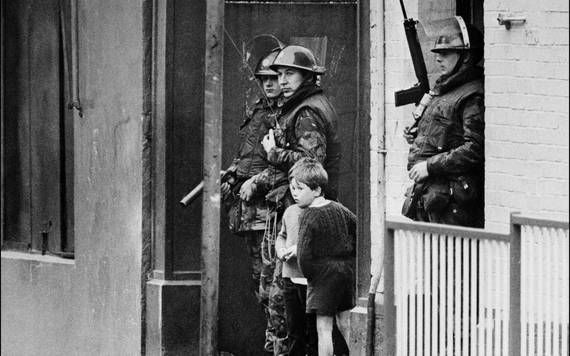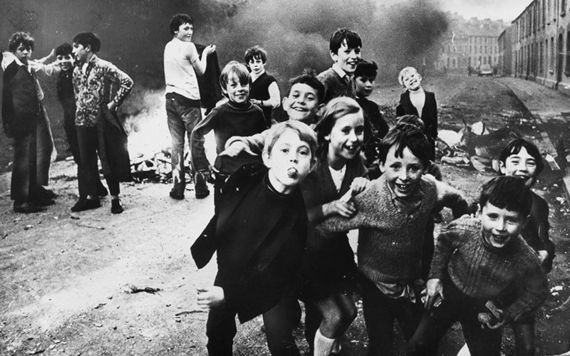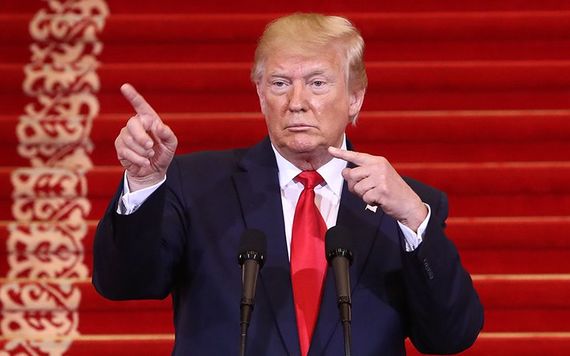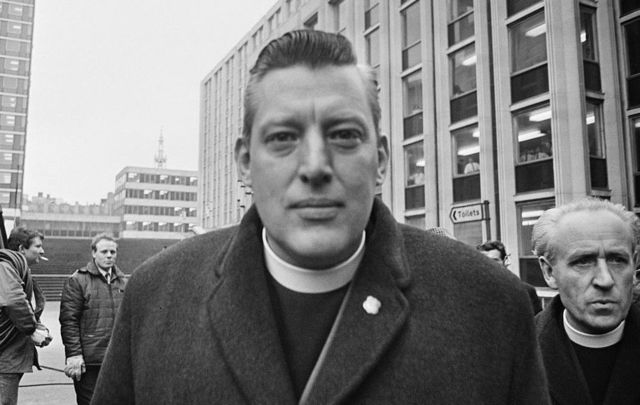Behind Trump I can see the shadow of Ian Paisley, one behind the other, inciting his base.
Do you remember the Troubles in the North of Ireland?
Do you recall how for roughly three and a half decades, you could be shot dead on your way to buy milk, or blown to pieces in a nightclub, or firebombed in a hotel, or obliterated by a car bomb?
I'm really sorry to bring this up, but the lesson was that you were never safe anywhere, ever.
So you just crossed your fingers. That was how dark it was. Every man and women, boy or girl was vulnerable to the mayhem and murder, no matter how many police and soldiers were on the streets.
Read more: What would Donald Trump's Scottish ancestors think of ICE crackdown?

Children alongside British soldiers during the Troubles. Image: Getty.
The violence and the threat of violence during the Troubles dramatically changed how people lived and worked, of course. Checkpoints were introduced to the cities and towns.
The architecture of war invaded the country lanes all the way to the border. Then the border itself starting looking like a Soviet control zone in East Berlin.
Surveillance helicopters hovered overhead day and night without ceasing. You fell asleep to the sound of them, you awoke to the sound of them too. Tourists stopped visiting. We were siloed in our misery.
I was born in Derry and I'm exactly as old as the Troubles so my earliest memories involve barbed wire, British soldiers, steel turnstiles and a profound sense of menace. But it's the sense of menace that I remember best because armed conflict doesn't make children feel safe, it marks them.

Children in Northern Ireland during the Troubles. Image: Getty.
To this day, I still flinch when I see an abandoned backpack anywhere in the world. When a car backfires, no matter where I am, I'm back in the North. So I was marked too, of course, I was.
I came to America just as the peace process was taking its first halting steps toward completion. I remember how relieved I was to be finally out of the shadow of that war. No more checkpoints. No more bomb scares. No more British soldiers looking into my belongings with a rifle across their backs. The relief was life-changing.
Motorcycles backfiring trigger panic at Times Square in New York City; police confirm there is no active shooter pic.twitter.com/Gsqs3ysUNY
— BNO News (@BNONews) August 7, 2019
Most of all I was glad to be away from the ranting Ulster demagogues. One in particular, as a matter of fact, the man who had united his paranoid followers through their rejection of everyone else in the country.
We haven't quite learned the lesson of Ian Paisley yet I think. It's understandable I suppose because it took him over 80 years to learn the lesson of himself.
For most of his life, Paisley was the wrecker of hope, of compromise and of peace. He was the iceberg to every Titanic. All hands went down with him, every single time.

Former DUP leader Ian Paisley. Image: RollingNews.ie. .
I bring him up this week because it took me a long time to figure out what I found so unsettling about Donald Trump. Looking at him, I would hear an echo of something that I couldn't place, like the notes to a piece of music I knew by heart but couldn't identify.
Until one day, watching his braying on a podium at one of his endless mini-Nuremberg's it hit me. Behind Trump I can see the shadow of Ian Paisley, one behind the other, inciting his base.
Like Paisley once did Trump is now telling them they are the the true guardians against invasion, that their opponents will all have to be dealt with, that their very survival depends on it, that he supports their struggle and shares it and that he believes in it too, that they will all need to build a giant wall to keep the invasion out and that he wants to send all the ones that they don't like back to their own shit hole countries.
Read more: Donald Trump, Ian Paisley both encouraged men of violence

US President Donald Trump. Image: Getty.
That's why when I see one I see the other now, like a double vision, or a photo negative. I see Trump daily turning his supporters into belligerent loyalists. And just like Ian Paisley, I see him looking the other way when the most ardent ones start lighting tiki torches or holstering up and getting into combat gear.
Trump, like Paisley before him, is uniting his core followers by asking them to fatally renounce most of the people and places that actually make up the United States.
His endless campaign rallies look like the white nationalist ethnostate he is leading them to for that reason. The future he is offering America was the one Paisley offered the North: defensive inward-looking unionism that sees everyone outside its limited embrace as the enemy.
I've seen this story before. I know how it ends. That's why we have to vote him out in the next election before the Troubles come here for good.
What are your thoughts? Let us know in the comments section, below.




Comments